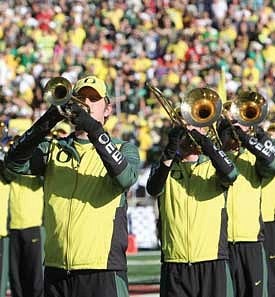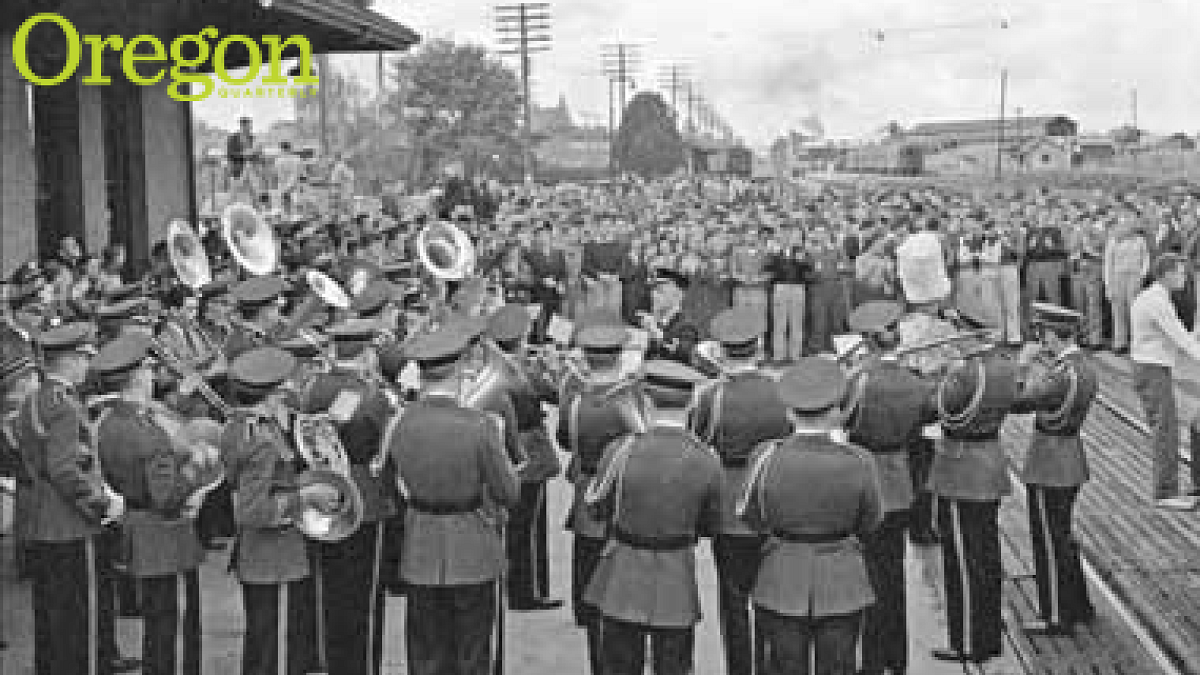Fall camp means two weeks’ worth of hot, twelve-hour days filled with full-on, sweaty drills, team-building, and precise practice. It means intense pressure to memorize the playbook and learn how to perform on and off the field at all times. It means going all out, losing the fear of making mistakes so in crunch time you won’t make any. Sure, the football team does some of this stuff, too, but we’re talking about the Oregon Marching Band.
“Sometimes I think there aren’t enough hours in the week for them to get ready,” says Eric Wiltshire, director of athletic bands. “But the kids have a remarkable capacity for just doing it. And they do.”
Like the Oregon football team, the OMB, as they like to be called, is on a roll. Numerous appearances on ESPN’s College Game Day, a gig at the BCS National Championship in 2011, two Rose Bowl parades and halftime shows in the last three years, and even a stint this spring making music for Wheel of Fortune’s “College Week” of all things is pretty fun stuff.

In 1929, the OMB performed its first halftime show. A decade later, when the Tall Firs won the first NCAA championship in basketball, the OMB led the rousing parade from the train station back to campus. In 1958, the Ducks football team made the Rose Bowl, giving the OMB a chance to sparkle in its first march down Colorado Boulevard.
In 1970, though, the OMB was dead. The student government ceased funding the group—deriding the “military” look of marching bands. “And many members of the band no longer wanted to participate,” remembers Burnette Dillon, who arrived on campus that year as the group’s new director only to learn the band no longer existed. But alumni and fans complained, the University responded, and the OMB returned to the field the next year, with the School of Music requiring its majors to participate. “After that, they had a cartoon of me in the paper standing atop the ladder leading a band that was in shackles,” laughs Dillon. “There was a rebellion against any kind of regimentation. It was the times.”
Today, the all-volunteer, 220-member OMB is enjoying a growth spurt. “We had 153 members in 2006 and I think we’ll be pushing 250 before long,” says Wiltshire. With music majors comprising only 20 percent of the group, the OMB boasts members from many parts of campus. “It is so much fun to be together and support our school,” says senior human physiology major and tenor sax player Sierra Hill. “We’re a tight-knit group.”
You see them everywhere on game days. “We get to the stadium around 7:30 a.m.,” says Hill. “We rehearse for two hours on the field, then split up, some playing for students entering the stadium and others heading to the Mo Center or PK Park and the tailgaters. Then there’s pregame and halftime.”
Amazingly, all their music and intricate field moves are memorized. Wiltshire and assistants Sean Wagoner ’94, MMus ’97, DMA ’01, and Micah Brusse arrange all the music and chart every move each individual makes. Is getting the right people to the right place playing the right music at the right time difficult? “We practice so much that eventually it just turns into muscle memory,” says Hill with a shrug.
Last year it was on to the Rose Bowl, where the biggest challenge was the parade. The route extends nearly six miles. “We were very concerned about our physical preparation,” says Wiltshire. “Eating properly is very important.” Members were told they would each burn between 4,000 and 6,000 calories during the sixteen-hour day. Saxophonist Hill downplayed the concerns. “We’re used to having long days,” she says. “It really wasn’t as hard as they said it might be.”
For Hill, an especially strong memory is of standing on the field at the Rose Bowl performing the “The Star-Spangled Banner” before a worldwide TV audience. “It was awesome how everyone in the stadium came together for that moment. The whole crowd was unified and listening. Then those jets flew over. It was amazing!”
The experience was equally satisfying for Wiltshire: “The Rose Bowl people are so good about featuring the bands and respecting the tradition they embody,” he says. “That’s why it is so important for us to represent ourselves well there—to rise to their high level and stay there. A lot gets thrust upon you during that week and our group responded and adapted.”
It is not surprising, though, that Autzen is the OMB’s preferred venue. Says Wiltshire: “As we’re waiting in the tunnel about to enter Autzen for that first game of the season, I always tell the band, ‘You are about to have an experience you will remember for the rest of your life.’” And they do.
—By Paul Roth, MS '92


